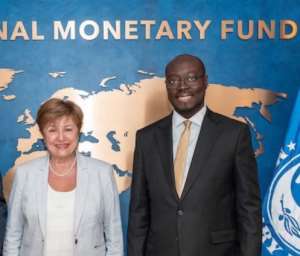
Ghana’s Finance Minister, Dr. Cassiel Ato Forson, has announced a major breakthrough in the country’s economic recovery efforts following the International Monetary Fund’s (IMF) approval of the fourth review under the Extended Credit Facility (ECF) programme.
The IMF Executive Board’s decision unlocks a critical disbursement of $370 million, injecting fresh momentum into Ghana’s ongoing reform agenda.
In a statement released shortly after the announcement, Dr. Forson celebrated the milestone, describing it as a firm endorsement of the government’s economic strategy.
“The IMF Executive Board has just approved Ghana’s 4th Review under the ECF Programme, clearing the path for a substantial $370 million disbursement!”
He further described the approval as validation of Ghana’s disciplined and focused approach to economic transformation.
“This landmark approval validates Ghana’s unwavering commitment to fiscal discipline and strategic economic transformation,” he said.
Ghana entered into the $3 billion, three-year ECF-supported programme in May 2023, following a period of intense economic turbulence, including soaring inflation, a rapidly depreciating cedi, and mounting debt. Each IMF review assesses Ghana’s progress on agreed reforms, covering fiscal consolidation, debt sustainability, and structural adjustments.
Dr. Forson stated that Ghana’s performance under the programme has exceeded expectations and earned international recognition.
“Our comprehensive macroeconomic policies and carefully crafted structural reforms are delivering real results that the international community recognizes and supports!” he said.
He framed the IMF’s endorsement as a pivotal point in Ghana’s road to recovery.
“Today marks another decisive step forward in Ghana’s economic recovery journey, demonstrating that our reform agenda is not just working — it’s exceeding expectations and rebuilding confidence in our nation’s financial future!”
The new funds are expected to support budgetary operations, bolster the cedi, and help meet Ghana’s external obligations as the government continues to push for macroeconomic stability and growth.
This progress comes amid ongoing negotiations with external creditors and Eurobond holders, as Ghana seeks to restructure its debt under the Common Framework — a critical component for the full execution of the IMF-backed programme.


